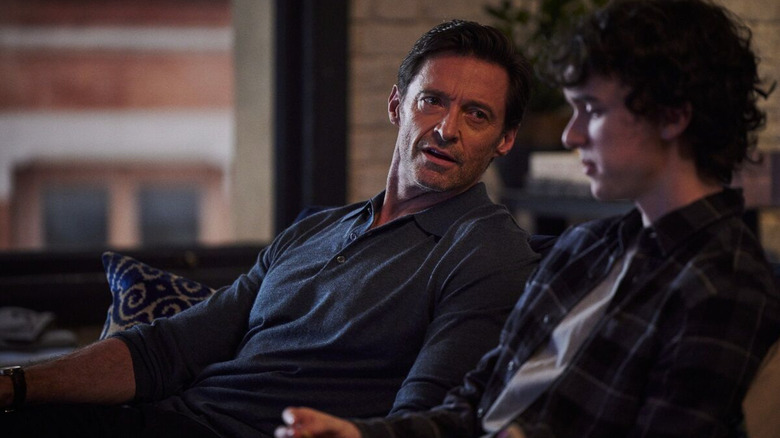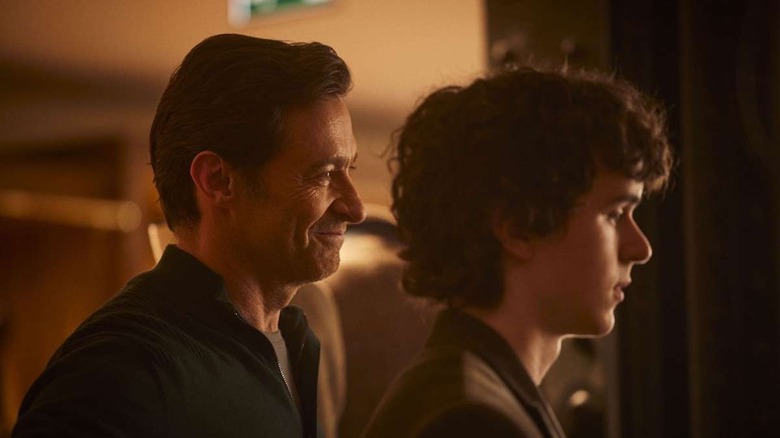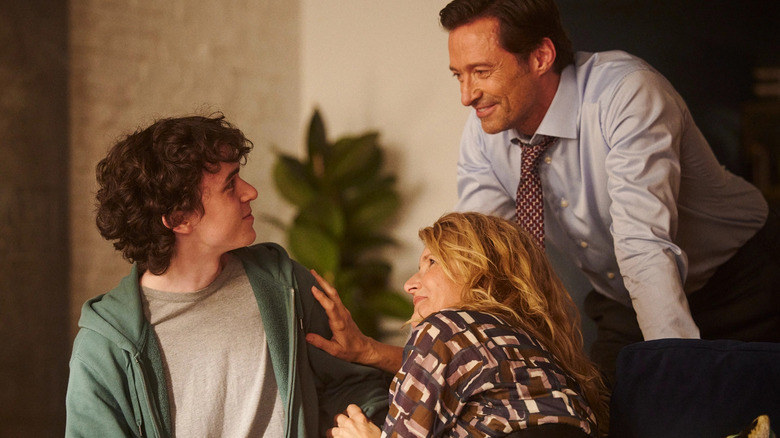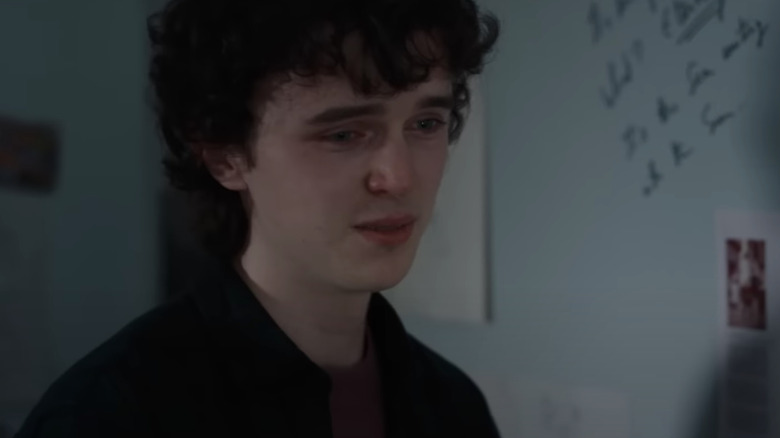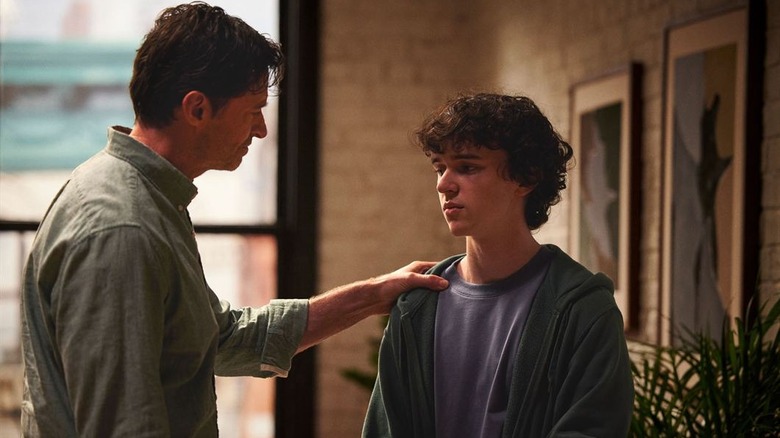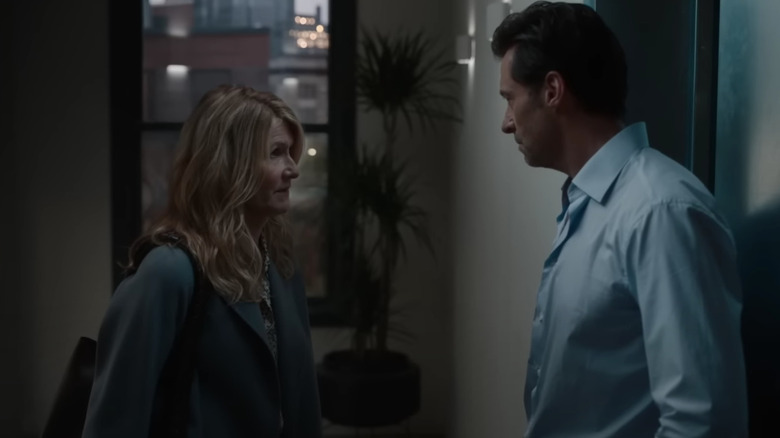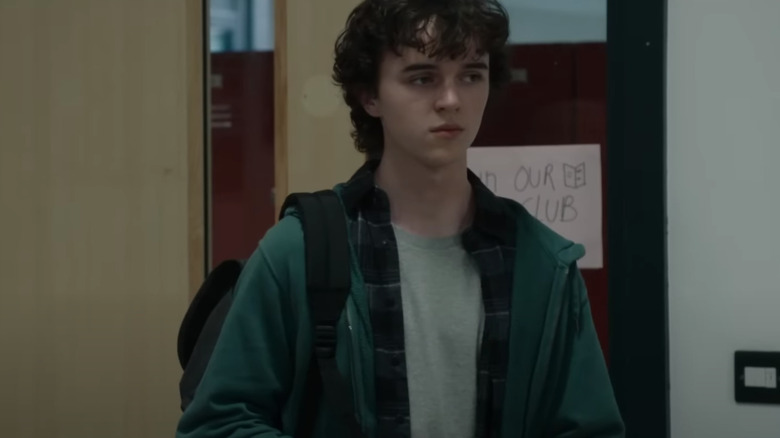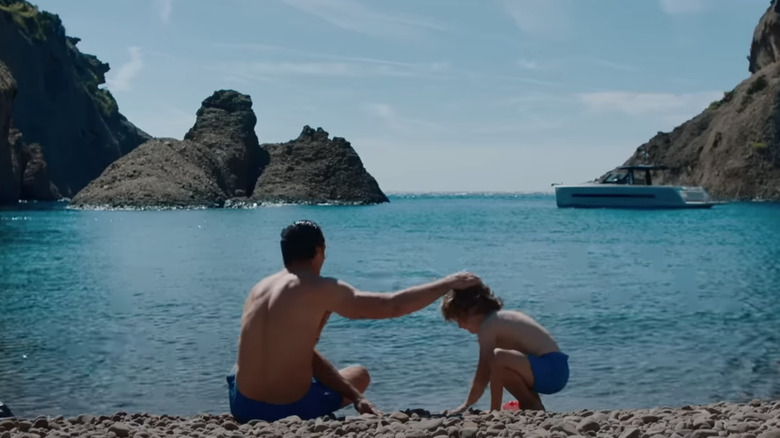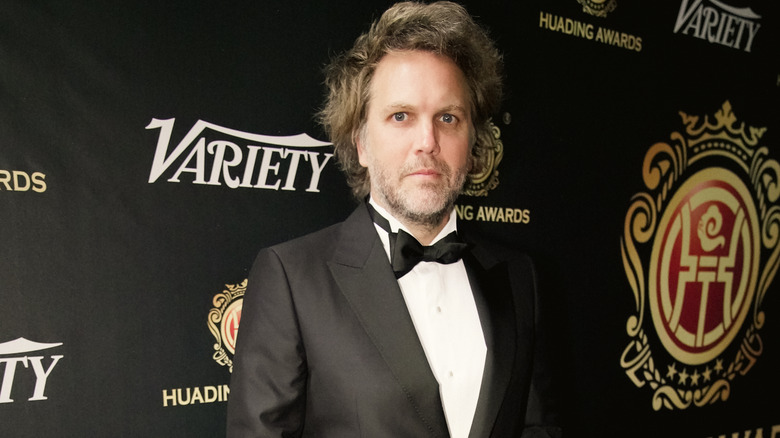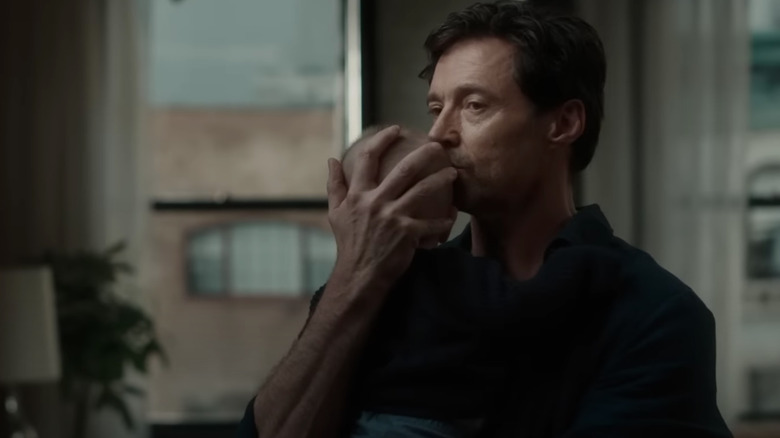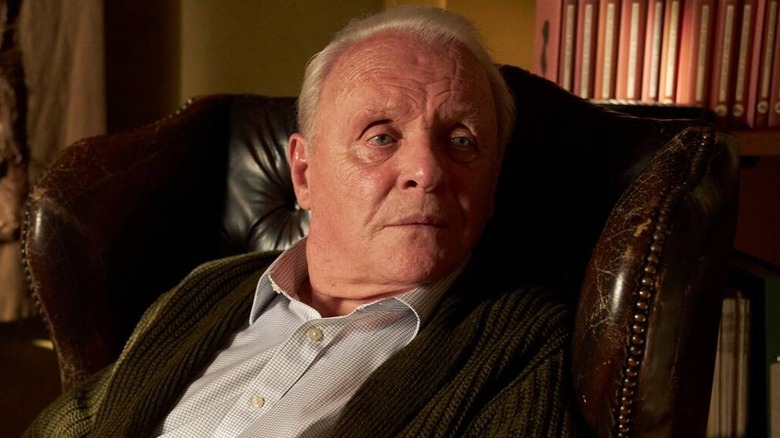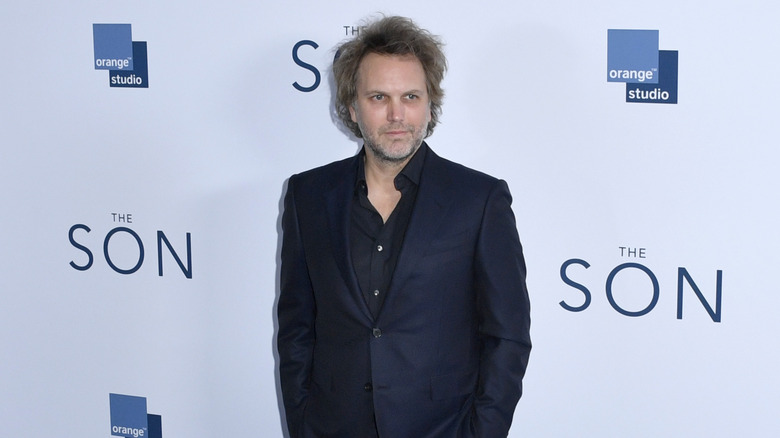The Ending Of The Son Explained
A 2022 drama from French filmmaker Florian Zeller, "The Son" is a follow-up to his debut film "The Father," which won two Oscars in 2021 and made him something of an overnight sensation. Expectations were high for his second film, but Zeller is no rookie; he spent many years honing his craft as a novelist and playwright before adapting his plays "The Father" and "The Son," enlisting the help of co-screenwriter Christopher Hampton for both adaptations.
Despite being a spiritual successor to his previous film, and tackling equally heavy subject matter with commendable commitment, "The Son" hasn't been anywhere near as successful as its predecessor. Zeller swung from one extreme end of the critical reception spectrum to the other with his two movies, making the early days of his directing career difficult to pin down. Unlike the complex, labyrinthine psychological machinations of "The Father," "The Son" instead plays out in a largely straightforward manner. It isn't until the film's ending sequence that the possibility for confusion arises, as the truth is called into question.
Below, a (spoiler-heavy) breakdown of the ending of "The Son," and what it all means.
What you need to remember about the plot of The Son
The plot of "The Son" revolves primarily around Nicholas (Zen McGrath), a teenager with divorced parents struggling with severe depression. At the beginning of the film, he lives with his mother Kate (Laura Dern), but soon decides to move in with his father Peter (Hugh Jackman) and his new, younger wife Beth (Vanessa Kirby). His parents' divorce is one of the biggest contributors to Nicholas's depression, alongside a general sense of apathy and inability to mesh with the world around him.
There is a sense that the people around Nicholas are afraid of what he might do to others , as well as himself. While the outward fears are largely misplaced, the inward ones are all too real. There is a period where Peter believes his son's disposition to be improving as he makes friends at his new school, but it is important to remember that Nicholas is lying to his father and hasn't even been going to school. Nicholas continues harming himself, and the self-destructive impulses grow in intensity until he can no longer ignore them.
One key scene to remember arrives near the middle of the film. Nicholas is caught hiding a knife in his bed, which he says is for self-defense but is actually being used to cut himself. In the same scene, the audience is informed through dialogue that Peter keeps a hunting rifle behind the washing machine in the laundry room. While the rifle is never shown, it is crucial to the film's ending sequence.
What happened at the end of The Son
As his self-harm impulses grow stronger, Nicholas eventually makes a suicide attempt. This first attempt fails, and Nicholas is rushed to a hospital and subsequently placed in a mandatory counseling program. Counter to its intended effect, the program exacerbates the young man's troubles, and he finds the experience unbearable.
After returning home, Nicholas tells his parents that he loves them in what secretly doubles as a final goodbye, unbeknownst to them. Nicholas then goes into the laundry room, where he retrieves his father's hunting rifle, and shoots himself. Though the shooting occurs off-camera, it is simple enough to infer what transpires through the sound of the gunshot and the horrified reactions of his parents as they rush to the laundry room.
The film then transitions into a flashback to many years prior, when Peter was teaching Nicholas how to swim as a child. When the film returns to the present, things seem to be much happier than when the audience left them. Peter sits alone in the living room until his son shows up at the door, happy and very much alive. Nicholas is shown to be in a far better mental space than at any point in the preceding film. He is in a long-term romantic relationship and has just finished writing his first book. Following their happy reunion, Nicholas leaves, and Beth joins Peter as he has an emotional breakdown.
If you or anyone you know is having suicidal thoughts, please contact the National Suicide Prevention Lifeline by dialing 988 or by calling 1-800-273-TALK (8255).
Did Nicholas die in the end?
While the ending of "The Son" isn't what some might consider "ambiguous," it might leave some questioning exactly what happened. The final moments of the film present contradictory information, without a concrete answer to be found regarding the true fate of Nicholas.
The definitive answer is: Yes, Nicholas died in the end. The reality of the film is that Nicholas took his father's hunting rifle and shot himself. The shooting and the body are both kept offscreen, so the precise details are left up to the viewer's imagination, but the film's final scene makes his death 100% clear. What causes confusion amongst some viewers is the odd structuring of the film's last few scenes, and a stylistic shift that brings in an element of subjectivity that wasn't found elsewhere in "The Son."
The return and happy reunion of Nicholas with his father are not literal, whereas the shooting and Peter's emotional breakdown that bookend the reunion are both literal. The final scene of the film progresses smoothly from Nicholas exiting the living room to Beth entering the living room, and this transitional moment indicates where fantasy ends and reality returns. Peter's breakdown in Beth's arms is in response to his son's suicide, his perceived failings as a parent, and all his regrets in how he raised his child and was ultimately unable to help him.
What does the return of Nicholas mean?
Without that brief, happy return after the gunshot, there would be no confusion nor ambiguity about the ending. This is the only scene in the entire film that adopts a subjective, non-literal point of view while the rest of "The Son" remains thoroughly grounded in reality and objective at all times.
After the suicide, the film jumps to a flashback of Peter teaching him how to swim when he was a child, then returns to the domestic setting in the future where Nicholas returns alive and in a great headspace. Directly following the flashback is a fantasy sequence in which Peter envisions his son living. This is a wishful-thinking outcome and shows what Peter imagines his son could have achieved and how his mood and disposition could have improved if things played out differently. The reality is that his son is dead, but the film offers both Peter and the viewer a glimpse of an alternate reality they had both taken different courses of action.
In the fantasy, Nicholas is doing better than ever, and he attributes his improvement and his success directly to his father. His book, which is bluntly titled "Death Can Wait," is dedicated to his father and all that he did for him. Peter envisions a future where he was able to solve his son's problems, but Beth's return to the living room indicates Peter's return to the reality where he wasn't able to save his son.
What was the message?
It should be abundantly clear to anyone who watches "The Son" that its core focus is mental health, or more specifically, adolescent depression. Trying to pinpoint the precise takeaway Zeller wants viewers to get out of the film is less of an easy feat. Drilling down deeper into the film can yield a few different answers — but it's up for debate which, if any, are the proper takeaways.
"The Son" obviously wants viewers to think about suicide, depression, and mental health in general, but an actual message beyond acknowledging the subjects as important issues is a bit more nebulous. One could read the message of the film as being an indictment of parents who ignore or downplay their children's suffering until it's too late; it could also be suggesting that loved ones are powerless to help with the inner turmoil of someone going through depression.
These messages are completely at odds with each other, yet the opaque nature of the film allows each reading to be valid. Similarly, the film could be viewed as presenting suicide as an internal inevitability for certain troubled individuals, or as a preventable outcome that stems directly from the actions of external individuals. This ambiguity in the messaging of "The Son" is a possible perceived fault in a film with as pointed a subject as mental health struggles and suicide.
Zeller has summed up his goal with the film as simply attempting to raise awareness about mental health struggles. Without a clear takeaway, "The Son" ends up starting a conversation with nowhere to direct it.
Is the mental health commentary effective?
The intentions of "The Son" are undoubtedly well-placed, though the film's efficacy at communicating its message is questionable. If nothing else, the film does succeed at bringing attention to mental health struggles, which surely counts for something.
Several years ago, "The Son" may have felt bolder as a film furthering such discussion, but the truth is that the film has been beaten to the punch several times over and, these days, feels rather toothless and inconsequential. In a review for RogerEbert.com, critic Nell Minnow wrote, "There is nothing more painful than having a child who is suffering... but in 21st-century Manhattan it is unimaginable that wealthy parents would be so clueless, self-involved, and disconnected from the available resources to bungle their response so badly."
Elsewhere, "The Son" has been labeled as insensitive and manipulative for the way it attempts to use suicide as a plot twist. One critic who considered the way "The Son" handles its themes as misguided was Odie Henderson of The Boston Globe. Henderson wrote, "Rather than investigate depression in a meaningful way, the script... shamelessly flaunts the threat of suicide for two hours." Henderson also took issue with how oblivious Peter is in regard to his son's obvious suffering, writing, "I find it impossible to believe that these well-to-do people living in a posh home in New York City in 2022 would be so damn clueless. This movie feels horribly dated, as if it were discovered in a time capsule sealed in an era when we were less informed about depression."
What was the purpose of the swimming flashbacks?
Throughout "The Son," the film occasionally leaves the main narrative behind to explore flashbacks. The flashbacks all center around a single experience, Peter teaching Nicholas how to swim when he was a young child. The film jumps back to this moment in time repeatedly, with the culmination of the flashback sequence arriving in the immediate aftermath of the suicide.
In the most functional sense, the final swimming flashback serves as both a buffer and a transitional scene between his suicide and Peter's fantasy of Nicholas living and recovering. To dig deeper, viewers must look back to the early scene where Peter and Kate meet at a restaurant for drinks to discuss Nicholas. Kate opens up about her feelings of failure as a mother while also looking back on the good times. She singles out their family vacation when Nicholas was a child as the time when they were at their happiest as a family. The memory of this positive experience is what the film flashes back to periodically.
Simply put, these flashbacks offer a form of escapism to happier times. When the present is bleak, the good memories are a reminder that things weren't always so bad, and that there is still hope to get back to a better place mentally and emotionally.
What have the director and star of The Son said about the ending?
Florian Zeller has spent a long time with the story of "The Son." He first wrote it as a stage play that debuted in Paris in 2018; it was performed at multiple sold-out venues all around the world and hailed as a hit. When it came time for Zeller to adapt his own play for the screen, he opened up the world of the story a bit, without changing much of the narrative.
For Zeller, the ending is meant to be tragic yet unavoidable. He told City A.M., "I wanted to do something linear and simple, like a line straight to an obvious destination... You know where it is heading from the start but you can't change the direction." After the narrative has concluded, Zeller included a title that dedicates the film to his eldest son Gabriel. He has said that the film is deeply personal and based in part on his experiences as the parent of a teenager struggling with depression, though it is important to note that Zeller's son did not meet the same tragic fate that Nicholas does on screen, and the film is far from being a true story. His ultimate goal with the film was to de-stigmatize conversations about mental health.
Hugh Jackman, on the other hand, has offered a slightly more fine-tuned perspective on the theme. For Jackman, there was one big takeaway that he hopes viewers receive from the ending of "The Son."
"When we're dealing with severe mental health crises, love is not always enough," Jackman explained. "[Loving them] doesn't mean you're the best person to really help. That's a really hard thing to admit."
Who is the titular son?
The obvious assumption would be that the film is named for Nicholas; after all, he is the son of Kate and Peter and the focus of the story. But while he might drive much of the drama, he isn't the protagonist of "The Son," nor is he the only son in the film. Jackman's character is both a father and a son.
Peter's relationship with his own father is fraught with deep-seated animosity. This character dynamic comes to a head when Peter goes to visit his father, played by Anthony Hopkins in a single scene. Peter's troubled relationship with his father informs how he approaches his parenting of Nicholas, for better or worse. Not only is the one big scene between Jackman and Hopkins full of conflict regarding their own father-son dynamic, but the grandfather projects his own insecurities about parenting onto how his son is rearing his grandson, making it all a multi-generational concern.
It's up for debate who the son of the title is, and a case could be made for Nicholas, Peter or even both. If it has to be just one of them, then it's most likely to be Peter — the true main character of a film told largely from his perspective. Since the audience is never given a clear understanding of the perspective of Nicholas, and never truly invited to empathize with his point of view, the case there would seem to be weaker.
How does it connect to The Father?
Zeller's previous film "The Father" has a lot in common with "The Son," and not just because of the seemingly cross-referential titles. The two can be thought of as a loosely connected duology, or as one being a spiritual sequel to the other. Given the fact that Zeller has made these two films back-to-back and that they both occupy similar dramatic and thematic territory, it would be natural to assume some type of literal connection between them, but that assumption may prove false.
There is no overlap in characters between "The Father" and "The Son," and the stories are completely independent of one another. The waters get muddied, however, by the presence of Anthony Hopkins in both films in the role of a father. Matters get even more confusing with Hopkins' character being named Anthony in both films. There is also a brief mention of his character having health troubles in "The Son" (Hopkins' character struggled with dementia in "The Father"), and the very nature of the "Anthony" in "The Father" was an unreliable character whose grasp on reality was playing cruel tricks on him.
Despite such similarities and possibilities, the two ailing fathers named Anthony played by Anthony Hopkins are 100% different. Zeller has even gone out of his way in interviews to dispel the misconception that they are meant to be the same character at different points in his life. When performed on the stage, the plays were thought to be connected as well — though the nature of live theatre allows for far more variability in terms of the interpretation from performance to performance than a single set-in-stone film could ever provide.
Will The Son receive another spiritual successor?
Since "The Son" was Florian Zeller's follow-up to "The Father" and his second effort as a director, it is natural to wonder if his third movie will follow in the same vein. Could it form the conclusion to a sort of spiritual, thematic trilogy? Judging from Zeller's work in live theatre, the latter seems likely.
In 2010, Zeller debuted "The Mother," followed by the 2012 play "The Father" and 2018's "The Son." The three already form a loosely connected trilogy, and many believe it all revolves around a single family, though the two films thus far have focused on completely unrelated groups of characters. Although it would make perfect sense for Zeller to adapt "The Mother" as his next film, that might not be in the cards for him.
"The Mother" was performed on stage as recently as 2019, with Isabelle Huppert in the titular role, who would surely be the prime candidate for the film adaptation as well. When Zeller was asked in an interview with Above the Line if "The Mother" would be his next film, he said, "I don't know yet. I'm still with 'The Son,' and I need to let him live his own life." When City A.M. asked him in 2023 what his next film would be, Zeller gave a more definitive answer.
"It's not 'The Mother'," he said, before offering up some wiggle room "I mean, who knows... It's very hard to finance films and sometimes that's good, it makes you question your desire and your reason to do it."
